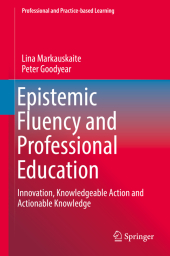 Neuerscheinungen 2017Stand: 2020-02-01 |
Schnellsuche
ISBN/Stichwort/Autor
|
Herderstraße 10
10625 Berlin
Tel.: 030 315 714 16
Fax 030 315 714 14
info@buchspektrum.de |

Peter M. Goodyear, Lina Markauskaite
(Beteiligte)
Epistemic Fluency and Professional Education
Innovation, Knowledgeable Action and Working Knowledge
1st ed. 2017. xxii, 636 S. 71 SW-Abb. 235 mm
Verlag/Jahr: SPRINGER NETHERLANDS 2017
ISBN: 9400743688 (9400743688)
Neue ISBN: 978-9400743687 (9789400743687)
Preis und Lieferzeit: Bitte klicken
This book, by combining sociocultural, material, cognitive and embodied perspectives on human knowing, offers a new and powerful conceptualisation of epistemic fluency - a capacity that underpins knowledgeable professional action and innovation. Using results from empirical studies of professional education programs, the book sheds light on practical ways in which the development of epistemic fluency can be recognised and supported - in higher education and in the transition to work.
The book provides a broader and deeper conception of epistemic fluency than previously available in the literature. Epistemic fluency involves a set of capabilities that allow people to recognize and participate in different ways of knowing. Such people are adept at combining different kinds of specialised and context-dependent knowledge and at reconfiguring their work environment to see problems and solutions anew.
In practical terms, the book addresses the following kinds of questions. What does it take to be a productive member of a multidisciplinary team working on a complex problem? What enables a person to integrate different types and fields of knowledge, indeed different ways of knowing, in order to make some well-founded decisions and take actions in the world? What personal knowledge resources are entailed in analysing a problem and describing an innovative solution, such that the innovation can be shared in an organization or professional community? How do people get better at these things; and how can teachers in higher education help students develop these valued capacities? The answers to these questions are central to a thorough understanding of what it means to become an effective knowledge worker and resourceful professional.
1 Introduction.- 2 Professional work in contemporary contexts.- 3 Defining the problem: four epistemic projects in professional work and education.- 4 The shapes taken by personal professional knowledge.- 5 Professional knowledge and knowing in shared epistemic spaces: the person-plus perspective.- 6 Understanding the mind.- 7 Epistemic thinking.- 8 Objects, things and artefacts in professional learning and doing.- 9 Epistemic tools and artefacts in epistemic practices and systems.- 10 Inscribing professional knowledge and knowing.- 11 Inscriptions shaping mind, meaning and action.- 12 Epistemic tools, instruments and infrastructure in professional knowledge work and learning.- 13 Taxonomies of epistemic tools and infrastructures.- 14 Professional epistemic games.- 15 Weaving ways of knowing.- 16 Rethinking the material, the embodied and the social for professional education.- 17 Conceptual resourcefulness and actionable concepts: concepts revisited.- 18 Epistemic resourcefulness for actionable knowing.- 19 Teaching and learning for epistemic fluency.- 20 Creating epistemic environments: learning, teaching and design.
"For educators of pre-service or in-service teachers, this book is even more important as it offers an alternative to conventional understandings of cognition and learning, and an array of strategies that may also be relevant to the way we teach in secondary and primary contexts. ... I highly recommend this book for researchers and educators who are involved in professional education or professional learning." (James Davis, Curriculum Perspective, Vol. 37, 2017)


